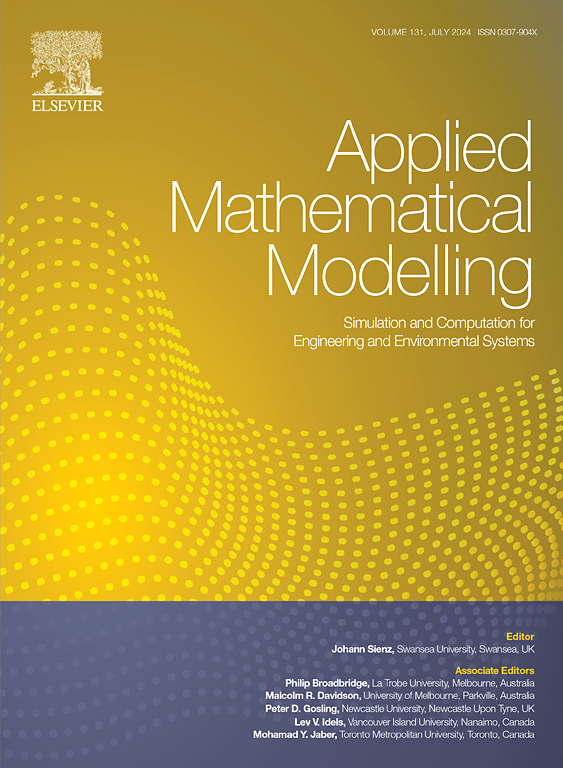A fast robust output tracking approach based on the GRU-ARX model with application to quadrotor
IF 4.4
2区 工程技术
Q1 ENGINEERING, MULTIDISCIPLINARY
引用次数: 0
Abstract
This paper concentrates on addressing the heavy computational burden caused by computation-intensive operations in online robust output tracking control processes for multi-input multi-output nonlinear systems. To improve the online computational efficiency of deep learning model-based controllers for compatibility with the sampling frequency requirements of fast-responding nonlinear systems, a novel robust control framework that combines offline-trained gated recurrent unit-based auto regressive exogenous model with adaptive triggering strategy is developed. Firstly, the proposed approach utilizes the hybrid deep learning model to capture the nonlinear dynamics for advanced system identification. Secondly, a dual-mode adaptive robust control strategy is formulated based on the pseudo-linear structure of this model to dynamically manage the controller updating behavior. This strategy consists of two aspects: the offline calculations for co-designing the triggered matrices and control laws through the linear matrix inequality-based synthesis with asymptotic invariant ellipsoids, and an online update mechanism that evaluates the triggering condition to determine whether to execute a search operation for the optimal solution within the offline precomputed list. Additionally, the closed-loop stability properties of the system under the proposed framework is established theoretically. Finally, the proposed algorithms are successfully conducted on a real quadrotor platform. Comparative real-time control experiments involving step tracking and anti-interference demonstrate that the adaptive triggering robust controllers can effectively alleviate the online computational burden without sacrificing the control performance roughly. These results indicate that the online computational efficiency is improved by about 79 % in step tracking and 85 % in anti-interference experiments. This framework proves particularly effective for fast-dynamic systems, facilitating the real-time implementation of deep learning model-based robust control methods.
基于GRU-ARX模型的快速鲁棒输出跟踪方法及其在四旋翼飞行器中的应用
本文主要研究多输入多输出非线性系统在线鲁棒输出跟踪控制过程中计算量大的问题。为了提高基于深度学习模型的控制器的在线计算效率,以适应快速响应非线性系统的采样频率要求,提出了一种将离线训练的门控递归单元自回归外生模型与自适应触发策略相结合的鲁棒控制框架。首先,该方法利用混合深度学习模型捕获非线性动力学,用于系统的高级识别。其次,基于该模型的伪线性结构,提出了一种双模自适应鲁棒控制策略,对控制器的更新行为进行动态管理;该策略包括两个方面:通过基于渐近不变椭球体的线性矩阵不等式综合的离线计算,共同设计触发矩阵和控制律;在线更新机制,评估触发条件,以确定是否在离线预计算列表中执行最优解的搜索操作。此外,从理论上建立了该框架下系统的闭环稳定性。最后,在一个实际的四旋翼平台上成功地进行了算法仿真。步进跟踪和抗干扰的实时控制对比实验表明,自适应触发鲁棒控制器在不牺牲控制性能的前提下,有效地减轻了在线计算量。结果表明,在阶跃跟踪和抗干扰实验中,在线计算效率分别提高了79%和85%。该框架被证明对快速动态系统特别有效,促进了基于深度学习模型的鲁棒控制方法的实时实现。
本文章由计算机程序翻译,如有差异,请以英文原文为准。
求助全文
约1分钟内获得全文
求助全文
来源期刊

Applied Mathematical Modelling
数学-工程:综合
CiteScore
9.80
自引率
8.00%
发文量
508
审稿时长
43 days
期刊介绍:
Applied Mathematical Modelling focuses on research related to the mathematical modelling of engineering and environmental processes, manufacturing, and industrial systems. A significant emerging area of research activity involves multiphysics processes, and contributions in this area are particularly encouraged.
This influential publication covers a wide spectrum of subjects including heat transfer, fluid mechanics, CFD, and transport phenomena; solid mechanics and mechanics of metals; electromagnets and MHD; reliability modelling and system optimization; finite volume, finite element, and boundary element procedures; modelling of inventory, industrial, manufacturing and logistics systems for viable decision making; civil engineering systems and structures; mineral and energy resources; relevant software engineering issues associated with CAD and CAE; and materials and metallurgical engineering.
Applied Mathematical Modelling is primarily interested in papers developing increased insights into real-world problems through novel mathematical modelling, novel applications or a combination of these. Papers employing existing numerical techniques must demonstrate sufficient novelty in the solution of practical problems. Papers on fuzzy logic in decision-making or purely financial mathematics are normally not considered. Research on fractional differential equations, bifurcation, and numerical methods needs to include practical examples. Population dynamics must solve realistic scenarios. Papers in the area of logistics and business modelling should demonstrate meaningful managerial insight. Submissions with no real-world application will not be considered.
 求助内容:
求助内容: 应助结果提醒方式:
应助结果提醒方式:


